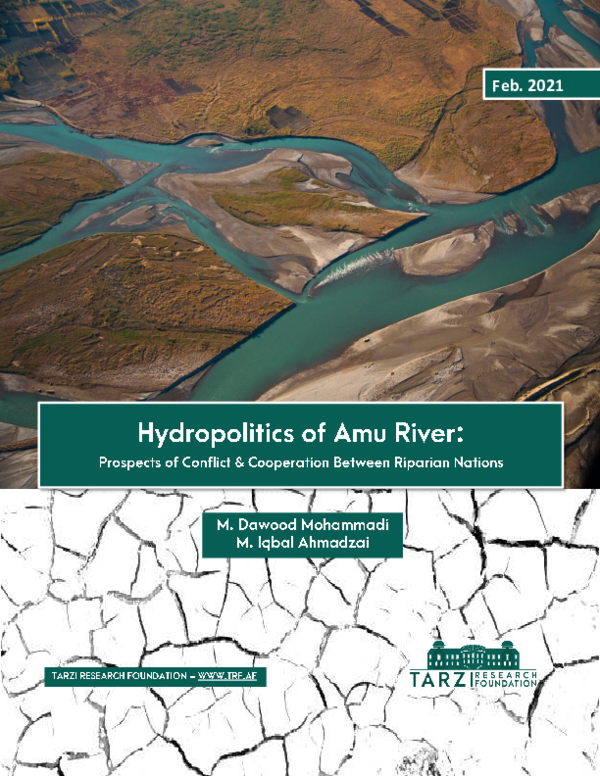The Dnieper River: Prospects For Peace And Regional Cooperation

Table of Contents
<p>The Dnieper River, one of Europe's longest rivers, flows through several countries, historically shaping their destinies and currently posing significant challenges and opportunities for regional cooperation. Its strategic importance, coupled with ongoing geopolitical tensions, makes the future of the Dnieper River a critical factor in establishing peace and stability in Eastern Europe. This article explores the prospects for peace and regional cooperation centered around the sustainable management and shared use of the Dnieper River.</p>
<h2>The Dnieper River Basin: A Shared Resource, Diverse Interests</h2>
<p>The Dnieper River basin encompasses a vast area, traversing through Russia, Belarus, and Ukraine. This shared geography dictates that the river's fate is intrinsically linked to the political and economic relations between these nations. The Dnieper's course, from its source in the Valdai Hills to its mouth in the Black Sea, shapes the landscapes and livelihoods of millions. This shared resource, however, presents both opportunities and challenges.</p>
<ul> <li><b>Economic Importance:</b> The Dnieper River is a vital artery for hydropower generation, providing electricity to numerous communities. It supports extensive irrigation systems, crucial for agriculture in the region. Furthermore, its navigable waters facilitate transportation and trade, linking various economic centers.</li> <li><b>Diverse Needs and Priorities:</b> Each riparian state has unique water-related needs and priorities. These differences, stemming from varying economic structures and developmental goals, often create tensions in water resource management.</li> <li><b>Transboundary Water Agreements:</b> The history of transboundary water agreements in the Dnieper basin is complex and, at times, fraught with challenges. Existing agreements often lack robust enforcement mechanisms, hindering effective cooperation.</li> <li><b>Potential Conflicts:</b> Unequal access to water resources, particularly during periods of drought or increased demand, can exacerbate existing tensions and lead to conflicts among riparian states.</li> </ul>
<h3>Water Security Challenges in the Dnieper Basin:</h3>
<p>The Dnieper River faces numerous water security challenges. Pollution from industrial activities and agricultural runoff degrades water quality, impacting both human health and the river's ecosystem. The construction of numerous dams, while providing hydropower, alters the river's natural flow regime, affecting downstream communities and ecosystems. Climate change further exacerbates these challenges, leading to increased droughts and floods, further stressing water resources. </p>
<h2>Opportunities for Cooperation: Building Bridges Across Borders</h2>
<p>Despite the significant challenges, opportunities for cooperation on the Dnieper River abound. Collaborative efforts are crucial for ensuring the sustainable use of this vital resource and fostering regional stability.</p>
<ul> <li><b>Joint Water Management Projects:</b> Implementing joint projects to improve water quality and quantity is paramount. This could involve collaborative efforts to reduce pollution, improve water efficiency in agriculture, and implement integrated water resource management strategies.</li> <li><b>Shared Infrastructure Investments:</b> Joint investments in infrastructure, such as modernizing dams, improving irrigation systems, and enhancing navigation facilities, can create shared benefits and foster trust among riparian states.</li> <li><b>Collaborative Research:</b> Conducting collaborative research on climate change impacts and developing adaptation strategies is crucial for building resilience to future challenges.</li> <li><b>Capacity Building:</b> Investing in capacity building and knowledge sharing programs among riparian states can enhance technical expertise and improve water management practices.</li> </ul>
<h3>The Role of International Organizations:</h3>
<p>International organizations such as the United Nations, the European Union, and the Organization for Security and Co-operation in Europe (OSCE) play a vital role in facilitating cooperation along the Dnieper River. They can provide technical assistance, mediate disputes, and promote dialogue among riparian states, fostering a shared understanding of the challenges and opportunities related to the river's sustainable management.</p>
<h3>The Dnieper River and Peacebuilding: A Pathway to Stability</h3>
<p>Cooperation on the Dnieper River can be a powerful tool for peacebuilding in the region. Addressing shared water challenges necessitates dialogue and collaboration, fostering trust and mutual understanding between states that may otherwise be embroiled in conflict.</p>
<ul> <li><b>Fostering Trust and Dialogue:</b> Collaborative projects provide platforms for dialogue and negotiation, helping to bridge divides and build trust among riparian states.</li> <li><b>Economic Cooperation:</b> Joint projects in water management and related infrastructure create opportunities for economic cooperation and development, promoting shared prosperity.</li> <li><b>Reducing Tensions:</b> Effective water resource management can reduce tensions related to resource competition, thereby contributing to regional stability.</li> <li><b>Shared Vision:</b> Working together towards a shared vision for the future of the Dnieper River creates a sense of common purpose and strengthens regional cooperation.</li> </ul>
<h2>Obstacles to Cooperation: Addressing the Challenges</h2>
<p>Despite the potential for cooperation, significant obstacles remain. Overcoming these hurdles requires political will, commitment, and effective mechanisms for conflict resolution.</p>
<ul> <li><b>Geopolitical Tensions:</b> Existing geopolitical tensions and mistrust among riparian states significantly hamper collaborative efforts.</li> <li><b>Lack of Political Will:</b> A lack of political will and commitment to collaborative efforts often hinders progress on crucial water management issues.</li> <li><b>Unequal Power Dynamics:</b> Unequal economic power and influence among countries can lead to imbalances in negotiating power and hinder equitable agreements.</li> <li><b>Absence of Dispute Resolution:</b> The absence of effective dispute resolution mechanisms can escalate conflicts over water resources.</li> </ul>
<h3>The Impact of Conflict on the Dnieper River:</h3>
<p>The ongoing conflict in Ukraine has had a devastating impact on the Dnieper River's ecosystem and the possibility of cooperation. Damage to infrastructure, pollution from military activities, and displacement of populations all contribute to significant challenges. However, even amidst conflict, the need for sustainable management and future cooperation remains critical. Post-conflict reconstruction efforts must prioritize restoring the river's health and establishing effective mechanisms for managing its resources.</p>
<h2>Conclusion</h2>
<p>The Dnieper River presents both significant challenges and remarkable opportunities for regional cooperation and peacebuilding in Eastern Europe. Sustainable management of its resources requires collaborative efforts among riparian states, addressing geopolitical tensions and fostering mutual trust. Investing in collaborative projects focused on the Dnieper River is crucial for ensuring regional stability and fostering lasting peace. A shared commitment to the sustainable use of this vital waterway is essential for the future of the region. Let's work together to build a future where the Dnieper River truly serves as a lifeline for peace and regional cooperation. Further research and international engagement are vital to realizing the full potential of the Dnieper River for peaceful development.</p>

Featured Posts
-
 Easter Holiday Trip Exploring The North East
Apr 25, 2025
Easter Holiday Trip Exploring The North East
Apr 25, 2025 -
 If Google Sells Chrome Could Perplexity Be The Buyer An Industry Analysis
Apr 25, 2025
If Google Sells Chrome Could Perplexity Be The Buyer An Industry Analysis
Apr 25, 2025 -
 Hindustan Unilever Profit Holds Steady Demand Slowdown Impact
Apr 25, 2025
Hindustan Unilever Profit Holds Steady Demand Slowdown Impact
Apr 25, 2025 -
 Homicidio Culposo En Caso Arrayanes Acusado Ofrece G 1 250 Millones
Apr 25, 2025
Homicidio Culposo En Caso Arrayanes Acusado Ofrece G 1 250 Millones
Apr 25, 2025 -
 Ankara Emniyet Mueduerluegue Nuen Yeni Yerleskesi Hizmete Acildi
Apr 25, 2025
Ankara Emniyet Mueduerluegue Nuen Yeni Yerleskesi Hizmete Acildi
Apr 25, 2025
Latest Posts
-
 Bowen Yangs Plea To Lorne Michaels A Different Snl Jd Vance
Apr 30, 2025
Bowen Yangs Plea To Lorne Michaels A Different Snl Jd Vance
Apr 30, 2025 -
 Trumps Dismissal Of Doug Emhoff From Holocaust Memorial Council Jta Report
Apr 30, 2025
Trumps Dismissal Of Doug Emhoff From Holocaust Memorial Council Jta Report
Apr 30, 2025 -
 Bowen Yang Asked Lorne Michaels To Replace Him As Jd Vance On Snl
Apr 30, 2025
Bowen Yang Asked Lorne Michaels To Replace Him As Jd Vance On Snl
Apr 30, 2025 -
 Post Election Silence Raises Concerns About Kamala Harris Leadership
Apr 30, 2025
Post Election Silence Raises Concerns About Kamala Harris Leadership
Apr 30, 2025 -
 Democratic Insiders Criticize Kamala Harris Post Election Absence
Apr 30, 2025
Democratic Insiders Criticize Kamala Harris Post Election Absence
Apr 30, 2025
